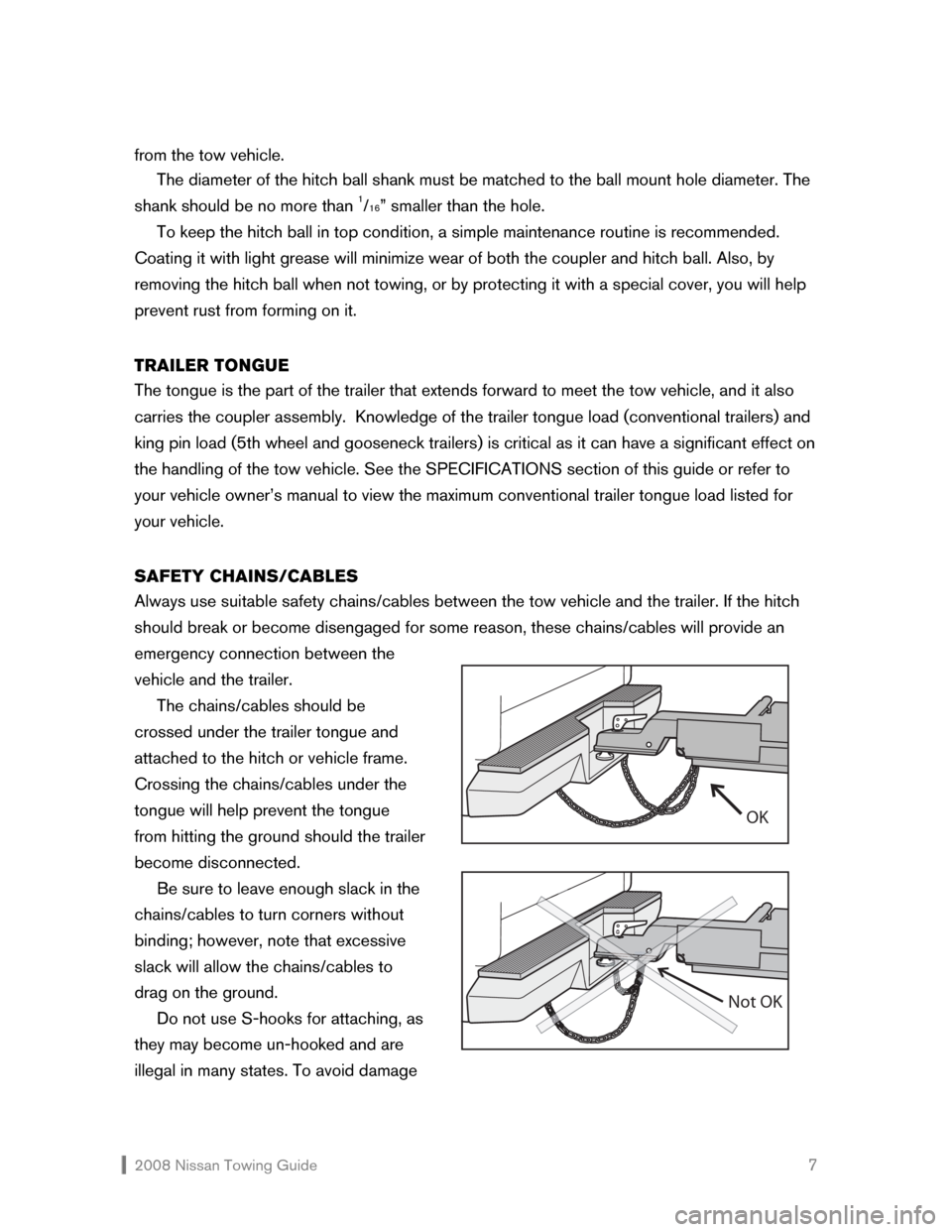Page 8 of 32

2008 Nissan Towing Guide 7 from the tow vehicle.
The diameter of the hitch ball shank must be matched to the ball mount hole diameter. The
shank should be no more than
1/16” smaller than the hole.
To keep the hitch ball in top condition, a simple maintenance routine is recommended.
Coating it with light grease will minimize wear of both the coupler and hitch ball. Also, by
removing the hitch ball when not towing, or by protecting it with a special cover, you will help
prevent rust from forming on it.
TRAILER TONGUE
The tongue is the part of the trailer that extends forward to meet the tow vehicle, and it also
carries the coupler assembly. Knowledge of the trailer tongue load (conventional trailers) and
king pin load (5th wheel and gooseneck trailers) is critical as it can have a significant effect on
the handling of the tow vehicle. See the SPECIFICATIONS section of this guide or refer to
your vehicle owner’s manual to view the maximum conventional trailer tongue load listed for
your vehicle.
SAFETY CHAINS/CABLES
Always use suitable safety chains/cables between the tow vehicle and the trailer. If the hitch
should break or become disengaged for some reason, these chains/cables will provide an
emergency connection between the
vehicle and the trailer.
The chains/cables should be
crossed under the trailer tongue and
attached to the hitch or vehicle frame.
Crossing the chains/cables under the
tongue will help prevent the tongue
from hitting the ground should the trailer
become disconnected.
Be sure to leave enough slack in the
chains/cables to turn corners without
binding; however, note that excessive
slack will allow the chains/cables to
drag on the ground.
Do not use S-hooks for attaching, as
they may become un-hooked and are
illegal in many states. To avoid damage
Not OK
OK
Page 17 of 32

2008 Nissan Towing Guide 16 the handling of your vehicle and cause a very unsafe situation.
Finally, do not carry flammable materials, such as gasoline, in your trailer. In the event of an
accident, an explosion or fire could occur.
ENSURING VEHICLE/TRAILER STABILITY
Improper loading, excessive or insufficient trailer tongue/king pin load, overloading, excessive
trailer weight, poorly designed trailer suspensions, crosswinds, and poor maintenance are all
things that can affect the stability of your vehicle and trailer combination.
If swaying does occur, check the cargo load for proper balance and distribution to ensure
proper trailer tongue/king pin load. In addition, check the condition of the suspension and
shocks, as well as the tires, tire pressures, and wheel bearings on both the tow vehicle and
the trailer. If swaying occurs because of high winds or poor weather conditions, wait until
these conditions improve before resuming your trip.
If the swaying continues and you feel your trailer is suitably balanced and within the towing
capacity limits of your vehicle, discontinue towing and consult your Nissan dealer or trailer
manufacturer to determine the problem. Most important, do not tow until the problem is
corrected.
VEHICLE SPEED
Some states have specific regulations and speed limits for vehicles that are towing trailers.
Always obey these ordinances.
Remember to reduce your speed in unsafe or less-than-ideal road conditions or weather.
When towing a trailer, braking distances increase while handling agility decreases. Always
leave yourself an extra margin of distance to respond to emergency situations.
PASSENGERS
Never allow passengers to ride inside a trailer while it is being towed. Not only is this
unlawful in most areas, passengers could be seriously injured during sudden trailer movement
or in an accident. In addition, trailers may allow fumes from the tow vehicle to leak inside. This
could result in carbon monoxide poisoning from the engine exhaust.
VEHICLE MODIFICATIONS
Vehicle modifications — beyond those required for proper hitch installation, wiring hook-up,
and necessary cooling system upgrading — are not recommended for any Nissan vehicle
being used for towing purposes. Changes to the drivetrain, suspension, exhaust systems,
frame structure/unibody, or other vehicle components are not necessary for towing within the
Page 18 of 32

2008 Nissan Towing Guide 17 limits described in this guide. These changes may diminish the reliability and longevity of your
vehicle and possibly void warranty coverage.
TOOL KIT
It is always a good idea to travel with a special tool kit when towing. In addition to tools, it
should contain flares, a flashlight, emergency reflectors, jumper cables, extra fuses, extra
radiator coolant, oil, and easily replaced spare parts such as taillight bulbs. You should also
carry spare tires for your tow vehicle and trailer, as well as a jack suitable for use on the trailer.
Be aware that not all automotive jacks can be used safely on a trailer.
BEFORE STARTING OUT
Before starting out on a trip, make one last inspection of the tow vehicle and the trailer. Are
the tire pressures correct? Are the safety chains/cables securely in place? Is the cargo tied
down securely? Do all the lights work? Is the coupler properly attached over the hitch ball and
secured using a locking pin? Is the breakaway switch hooked up and functioning properly?
Are vehicle and electric trailer brakes working properly?
Make a checklist of key items to be inspected, and don’t forget the basics. When towing,
vehicle engine oil, transmission oil, and coolant should always be checked before starting out.
Finding a potential problem while in your driveway is better than discovering it miles from
home.
TOWING
TIPS
If you’ve never towed a trailer before, be aware that it does take getting used to. To begin with,
towing noticeably affects your vehicle’s performance:
�Š It will not accelerate as quickly — an important point to keep in mind when merging onto a
highway.
�Š It will not stop as quickly. Leave more room than usual between you and the traffic ahead,
and brake sooner when coming to a stop.
�Š Abrupt maneuvering can unbalance the load and reduce the handling stability of your tow
vehicle. Plan ahead and make lane changes and turns smoothly.
If possible, before you actually hit the open road, practice towing in a large uncrowded area
such as a stadium or shopping center parking lot. Become especially familiar with backing up
a trailer — the maneuver many people find most difficult.